
Lost Judgment Review
Over two years ago, the world met and fell in love with Takayuki Yagami, Kamurocho’s finest scrappy detective. Judgment dazzled both newcomers and veterans to the Yakuza series as it delved into a darker side of Ryu ga Gotoku Studio’s long-running franchise without the pressure of numerous legacy titles leading up to it. The spin-off provided a fresh new perspective to the familiar streets of Kamurocho and became a beloved entry in the Yakuza-verse.
Now we have a sequel, Lost Judgment. It not only vastly improves upon its predecessor in nearly every single way, the overall package it offers also positions itself as one of RGG Studio’s finest works.
Before digging deeper, I want to be absolutely clear that Lost Judgment is one of the darkest tales that the entire Yakuza franchise has ever tackled. Those sensitive to heavy themes surrounding bullying and suicide should be especially cautious. As much as I enjoyed my time with this game, the unifying theme of its main story and many side-stories revolves around how bullying manifests in different forms, depicting the direct and indirect ways it devastatingly impacts all parties involved. Lost Judgment doesn’t shy away from these extremely sensitive topics as it slowly unfurls the truth behind its bizarre mystery.
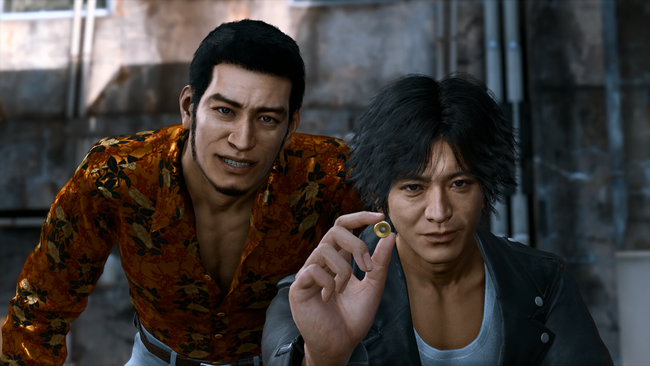
Kicking off Lost Judgment is the discovery of a rotting, unidentified corpse in the city of Isezaki Ijincho, a place that Yakuza: Like a Dragon players should be familiar with. Shortly following the chilling intro sequence is a court hearing for Akihiro Ehara, a police officer caught on tape committing sexual battery. As Ehara confesses, he offers a shocking revelation: he not only knows about the mysterious body found in Ijincho, but he also correctly identifies whose body it is.
Of course, this invites suspicion that he is the primary suspect in that case, yet the time and place of Ehara’s sexual battery crime proves that there is no way he could actually be responsible.
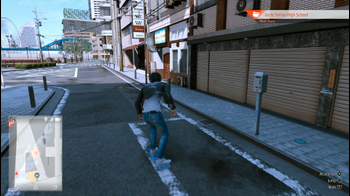
Meanwhile, Yagami and his partner Kaito depart Kamurocho for Ijincho this time around to help out returning characters Tsukumo and Sugiura run a new detective agency of their own. A client has them all go undercover at the local Seiryo High School to investigate allegations of bullying.
Lost Judgment chronologically occurs after the events of Yakuza: Like A Dragon and incorporates the radical shifts to the overall series’s world setting established during that game. Those who skipped Like a Dragon will find there are some minor plot beats that may be hard to follow.
As a long-time player and fan of the Yakuza series, I genuinely think Lost Judgment’s story is one of my favorites in the entire franchise. RGG Studio has concocted a deeply engaging and compelling narrative that feels more earnest and grounded than past Yakuza entries. In particular, several smart, conscious game design decisions during the game’s early hours set the tone for this brilliant execution.
It is fascinating how laser-focused RGG Studio is on placing bullying under a magnifying glass. The first time the term ‘bullying’ is even mentioned in Lost Judgment, Tsukumo provides a thorough scientific breakdown of why bullies bully on a physiological and psychological level, as if they stepped into a Zero Escape game briefly.
In video game terms, Lost Judgment doesn’t fully open up until the first major arc of the story reaches a sustainable resolution. This initial arc heavily focuses on a specific girl that is tormented by bullies daily. I was impressed at the restraint RGG Studio maintained here, in order to ensure that players remain focused on this particular story without any distractions, which was one of my initial concerns going in. Due to the series’s nature of having a primarily adult character cast, this sequel provides a unique viewpoint that not many other games can pull off.
There is considerably nuanced insight on how to address bullying when adults identify, acknowledge, and observe it in front of them both from an insider and outsider’s perspective, especially when the societal norms and culture of the modern Japanese school system are taken into account. The game is exceptionally good at delivering believable dialog that emerges from these kinds of scenarios. I wouldn’t say that the overall execution absolutely nails it, but it was close enough for me.
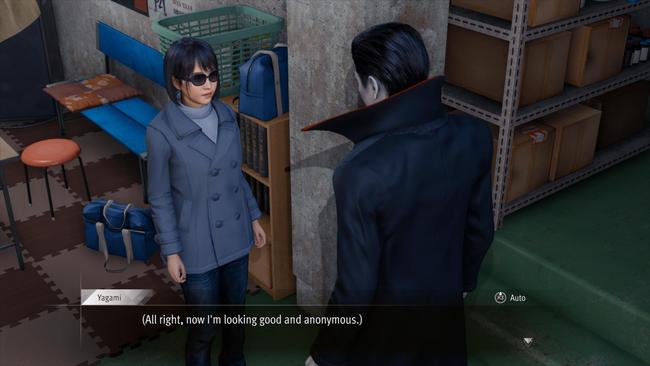
That being said, there is much more to Lost Judgment than what it initially presents. If you are coming to this from Judgment, the amount of improvements are innumerable. However, let me say this upfront - tailing missions are unfortunately still tedious, though they are done better this time. Someone at RGG Studio has a sick sense of humor, as the very first thing you do in Lost Judgment is… a tailing mission. Still, these segments flow much more naturally at the cost of being slightly more challenging. Spots to hide behind are no longer highlighted, and the target’s “suspicion meter” has been altered to a percentage that no longer depreciates if you hide; instead, players now have a separate gauge to act casually if they’re spotted to get the heat off of them if they screw up.
Combat has seen huge refinements across the board, too. Attacks come out faster now without having to rely on a combo speed perk like in the original, leaving everything satisfyingly speedy from the get-go. The Crane stance’s moveset has been entirely reworked, boasting new moves that complement the style much more fluidly along with the new Sky Dancer maneuver that can be further enhanced to give Yagami more attack options against crowds of thugs. Meanwhile, the Tiger stance retains all of its defining traits and moves, but now more skills are unlocked from the very beginning. Switching between fighting styles no longer feels cumbersome and is done instantaneously, which enables style switching mid-combo much easier. Attacks no longer clumsily bounce off when enemies block either!
Lost Judgment also adds a brand-new fighting style, the Snake stance. Yagami flexes his aikido skills, which are meant to somewhat ease the awkwardness of a detective beating up rowdy high school students, though this style can be used against anyone once unlocked. Yagami can disarm hostiles with Snake and parry incoming attacks to leave foes defenseless. The Snake stance can instill fear into nearby enemies as well, and when an EX Attack is inflicted upon someone frightened, Yagami finishes them non-violently. It is an extremely fun new option to add onto Yagami’s arsenal of martial arts that I kept coming back to again and again.
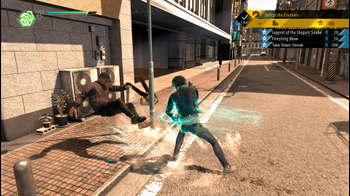
Another noteworthy improvement is that skill points are much easier to accrue thanks to Lost Judgment’s new battle reward system. These give additional points to every battle encounter players engage in based on what they decide to do in combat. Most of these are things that you’ll naturally do, such as taking down an enemy with a specific battle style, executing an EX Attack, eliminating a downed enemy, subduing someone without getting hit, and such. There’s an upgrade path that considerably multiplies the amount of skill points you receive both in encounters and in battle rewards that enables skill enhancements at a much more rapid pace as well.
Judgment veterans will especially appreciate that mortal wounds are gone, which is a major quality-of-life upgrade. Bosses and tougher enemies do still go into an enrage mode that initiate mortal attacks though, but all they do is inflict heavy damage (which is recoverable with normal healing items!) if Yagami gets hit with them. In Lost Judgment, players can turn the tide right back at incoming mortal attacks, by evading at the right time to trigger a mortal reversal. All that damage Yagami normally would have taken is now sent right back to the enemy. These have special animations for each battle style too.
Here’s one more for those who played the original - the frustrating system that arbitrarily bumped up the encounter rate to a ludicrous amount at random intervals in the original game is now gone, too. Returning Judgment player, we are eating.
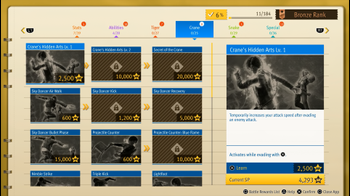
Less thrilling is how some QTE chains appear out of nowhere during several key fights - and in one specific fight I encountered, it was an instant game over, upon failure, which was a little annoying.
Although the mainline Yakuza series has shifted to a turn-based battle system for the foreseeable future, Lost Judgment carries the torch as a beat ‘em up brawler astoundingly well. All of its improvements make it stand toe-to-toe with Yakuza 0 as my favorite brawler battle system in the series yet. There are a lot of new and creative EX Actions to discover too, especially the brutally stylish knee slide on a downed opponent’s head.
Outside of its much refined battle system, this sequel adds a lot of gameplay systems that spice up Yagami’s job as a detective. The developers weren’t shy about paying homage to their inspirations. Yagami awfully looks a lot like Nathan Drake in Lost Judgment’s new parkour segments that incorporates another system present in a certain other first-party Sony title too - a grip meter. Dedicated sneaking segments have Yagami put on his best Agent 47 act as he hides from cover to cover, distracting people by tossing a coin near them, then choking them out when they aren’t looking. The implementation of these systems is somewhat mediocre, though they certainly help add variety to break up the action here and there.
A handful of new detective gadgets aid Yagami’s adventure, so he’s less reliant on Kaito’s drone this time around in favor of a noise amplifier, a detector for suspicious radio transmissions, and an adorable canine that aids with your detective work from time to time.
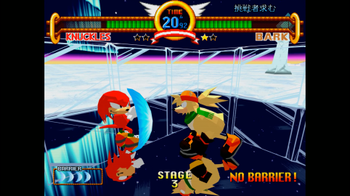
Speaking of variety, one of Lost Judgment’s strengths is the sheer number of side activities it offers. Staples like mahjong, shogi, drone racing, and that neat House of the Dead-esque game return. Sega managed to unearth the 1996 game Sonic the Fighters for this entry along with several Sega Master System titles to revisit. A neat quirk about the Master System titles is that it offers players the option to choose whether they’d like to play the Japanese or English version upon boot-up.
What really elevates this game for me is the new School Stories system. Aside from the usual Side Cases that Yagami stumbles across, he eventually takes up the mantle of overseeing Seiryo High School’s Mystery Research Club. Their latest case follows the trail of an enigmatic entity known as the Professor; Seiryo High School has its fair share of problem students as is, and this Professor seems to be behind most of its egregious ones. The MRC has Yagami infiltrate numerous clubs and community groups both on and off the campus to investigate the Professor’s involvement with them.
This basically gives an interesting, unifying narrative as an excuse to explore and enjoy a lot of the minigames Lost Judgment has. Most of them are a ton of fun, but the two that really hooked me were the boxing gym and robotics club; these minigames are particularly strong. Building and tinkering my trio of robots in its territory control game via Tetris blocks consumed me for several hours. I wish the boxing minigame in particular supported online multiplayer; it’s so good.
Each of the others have aspects I quite enjoyed too. Although the skateboarding gang story emphasized a lackluster mode mimicking a very lite version of Tony Hawk’s Pro Skater, the optional skateboarding races were a blast. The eSports club school story got a laugh out of me once I realized which game it chose to progress its plot. Advancing the ranks of a biker gang had its moments, too, and offered multiple types of bikes to spec out and customize. Hanging out at the Girls Bar was worth it because of a dumb minigame trying to construct legible sentences in a set amount of time and the more drunk Yagami is, the harder it becomes, and so on.
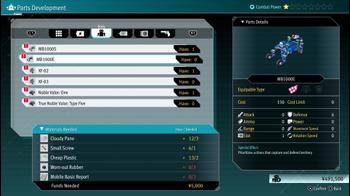
All of the school story activities come with their own ongoing story too, of course. Not all of them are high marks, yet there are a few gems among them (once again, the boxing one is so good). They all can’t be done immediately once they open up; some school activities are gated either by main story progression or Yagami’s social stats, which can be raised by partaking in other school stories. Some school stories don’t even unlock at all unless his social stats meet a certain threshold. RGG Studio really went all-in on providing different experiences for Lost Judgment’s minigames, and a good chunk of them have an unexpected amount of depth.
Other smaller, miscellaneous things round out Lost Judgment’s overall package. Players can befriend a handful of stray cats throughout Ijincho and Kamurocho; give them names, pet them, feed them, and love them. For whatever reason, the LIPS system from the Sakura Wars is in Lost Judgment in a tiny way. There are a few times where Yagami either has to make a decision before time runs out or choose the intensity of his voice for something he wants to say, which are both staples of it.
I love a lot of what Lost Judgment has done. I can see that it’s trying to establish its own identity apart from the mainline Yakuza series in a stunning fashion. A lot of the critical opening hours of Lost Judgment feel very different to the typical Yakuza game. The plot becomes a tad messy leading into its final stretch, but there are many hard-hitting sequences that stirred me. On the flip side, I was disappointed that Lost Judgment recycled some of the more tasteless narrative sequences from the first game and recontextualized them to somehow make it even more awkward. I see it more as a lost opportunity to have done something better for a certain character, and it is probably my single biggest complaint on an otherwise stellar title.
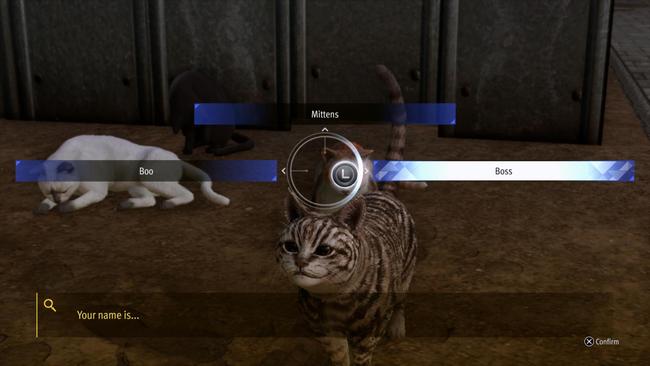
Lost Judgment is without doubt one of the best games this year. Despite the strange circumstances that brings its ensemble together, it tells a much more human story than its predecessor. There’s a certain level of care in Lost Judgment’s presentation that is on the brink of something special and magical. I’ve only played the game with Japanese voices and so can’t speak authoritatively on the quality of its English dub, but the quality of the actors’ performances hit another level in some of the game’s most important scenes.
If you’re looking for 2021’s most-improved sequel, Lost Judgment might be it. It offers many new and cool things to do while striking a fine balance between a goofy Yakuza spin-off and a spectacular crime drama that tackles difficult themes not seen often enough in games.